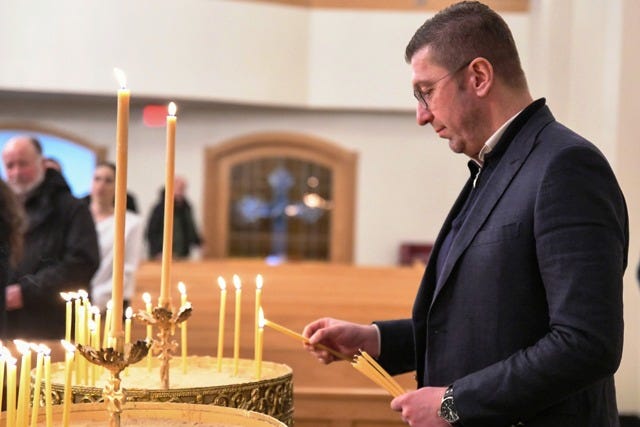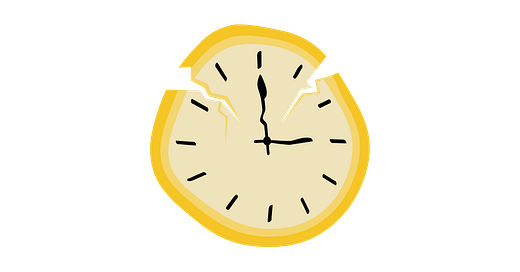The day Serbia stops
A general strike in Serbia and the Trump effect in the Balkans. But also: old controversies are back, Eurovision dropouts, and Croatian gunslingers.
Hello there,
Balkan Brew is here, and you know what that means — it's Friday! This week has been a long one, packed with news (and not exactly the most uplifting kind). But don’t worry! Today’s selection is balanced and hopefully, it will help you tackle the final stretch before the weekend with a better vibe.
We’re kicking things off with Serbia. The situation there is constantly changing, so we teamed up with historian Miloš Vujnović to get a better understanding of what’s happening. And of course, we couldn’t skip Trump’s inauguration or Melania's impact in Slovenia. To round it all out, we’ve got a dive into an old North Macedonia-Greece controversy. And finally, Croatian gunslingers and Moldova’s overly confident singers.
JUST FOR TODAY. It’s Tommaso’s birthday! Why not give him a little gift by forwarding this newsletter to a few friends who might want to subscribe? We’re asking nicely — don’t make us pull a JD Vance. Want to subscribe? Just click here 👇
The day Serbia stops
Protesters in Serbia have called for a general strike today, January 24. It’s shaping up to be one of the biggest protest days in the country’s recent history. People from all walks of life — entrepreneurs, employees of cultural institutions, restaurant and café staff, and even public administration workers — are joining in.
WHAT’S GOING ON? The protests began after part of the railway station in Novi Sad collapsed, tragically killing 15 people. What started as outrage is growing by the day, and the government seems increasingly uneasy.
Could this be a turning point for a country where even massive protests in recent years haven’t brought much change? We spoke to historian Miloš Vojinović, the author of the newsletter Vremenska Mašina, to help us understand what sets this movement apart from others in Serbia’s recent history.
GETTING CLOSER. An investigation by Nova Ekonomija has cast doubt on the role of Nataša Vukšić, a close associate of President Aleksandar Vučić, in the Novi Sad train station renovation — completed just before the tragic collapse.
NERVOUS TIMES. Adding to the tension, 14 foreign citizens attending an NGO forum in Belgrade were detained by police on Wednesday night, January 22. They were later expelled and banned from the country for one year, labeled a “security risk”.
The Trump Effect
Donald Trump is officially the 47th US President. If you’re curious about what that means for the Balkans, check out this special issue we put together right after his election win.
JUST A SMALLTOWN GIRL. Trump’s comeback also brings back Slovenia-born Melania Trump, the First Lady — who, for some, is "the most important Slovenian of all time".
MELANIA CAKE. Her hometown, Sevnica, marked the inauguration with a special program that included a free tour of places she grew up and, of course, a slice of “torta Melanija” at a local pastry shop (and yes, we’ve got the recipe!).
BUT. One thing’s clear: Slovenians are getting tired of hearing the story of Melania as the humble girl from a poor communist country who became the First Lady of the United States — the version of her story that’s been sold to American audiences.
SPEAKING OF PORTRAITS. If you’re in Tirana, don’t miss the exhibition running until January 26, showcasing the graphic work of Albanian artist Avni Delvina. His art celebrates the victory of Donald Trump.
Say my name
This week, Greek media and politicians revisited a controversial and all-too-familiar topic: North Macedonia’s official name. The debate kicked off after a comment by Hristijan Mickoski, North Macedonia’s nationalist PM, who supposedly told a group of fellow Macedonians in the US that the name dispute between the two countries isn’t resolved.
BUT HERE’S THE THING. We couldn’t find any solid evidence that he actually mentioned the name issue directly. Here’s what Mickoski did say according to local media: “We need to start winning in Washington, Brussels, Berlin, London, Paris, Rome if we want the Macedonian issue to finally arrive at its conclusion. Our issue is not settled. It’s been smoldering for centuries and it still exists”.

IN CASE YOU MISSED IT. The name issue between Greece and the then Republic of Macedonia lasted for the good part of 30 years. Until 2018, when a controversial process brought an end to it: the latter became North Macedonia and was granted EU access talks.
PSYCH! But then in 2020, Bulgaria dropped a veto bomb, blocking the newly named Republic of North Macedonia from joining the EU. That move kind of sparked a nationalist revival in the country.
FUEL. Gordana Siljanovska-Davkova, the nationalist Macedonian President elected in May 2024, used the country’s old name in her first speech after the victory.
BACK AND FORTH. Athens answered, saying that the issue is irrevocably resolved. But, in an interview on Thursday, Mickoski justified himself by saying he “never mentioned Greece” and he was surprised by the reactions.
IN OTHER NEWS.
The University of Athens in Greece is calling on the government to pause a law that forces universities to expel students who don’t graduate within the maximum study duration — also known as “eternal students”. The law is meant to help universities track how many active students they have and "assess their real needs".
The European Court of Human Rights rejected Călin Georgescu’s request to annul the Romanian Constitutional Court’s decision to repeat the presidential elections.
In Slovenia, three men died in an accident at the Velenje mine.
Residents of Croatia are boycotting shops today to protest rising prices in the country.
78 people died in Turkey last Monday when a fire broke out at the Grand Kartal Hotel in the Kartalkaya Ski Resort, Bolu municipality. 11 people, including the business owner and the deputy mayor were arrested.
Developing: the majority at the State level assembly in Bosnia and Herzegovina might get a reshuffle following no support from SNSD (the party of Bosnian Serb leader Milorad Dodik) to important EU-related reforms.
AND FINALLY. Here at Balkan Brew, we’re big Eurovision Song Contest fans — so you can imagine how heartbroken we were when we found out Moldova won’t be taking part in this year’s edition. Teleradio-Moldova held a contest to pick the country’s entry but ended up backing out, citing “the general quality of the songs and artistic performances”, among other reasons. If you missed the show, no worries — catch it here (ain’t you lucky?).
ANOTHER ONE BITES THE DUST. By now, regular readers of this newsletter know that ministerial resignations are practically a national specialty in Croatia — kind of like Bajadera or Pipi. But when one of your ministers gets caught on camera firing a gun from a car, you really don’t have much of a choice.
REAL BANGER. In the video, (former) minister Josip Dabro fired several shots while listening to the melancholic “Karanfil se na put sprema”, a classic by Bosnian singer Zehra Bajraktarević. She reacted to the news by reposting the song on her Facebook profile with a simple message: And yet they say this song’s no good.
And that’s a wrap for this week! If you spotted any mistakes, have suggestions, or just want to say hi, feel free to reach out—we’re always happy to hear from you. Just hit reply to this email. You can also find us on Bluesky, the social network where Roman salutes are bad. Like, really, really bad. This is us: Tommaso and Rodolfo.
Until next Friday, have a bangin’ week!
BB











